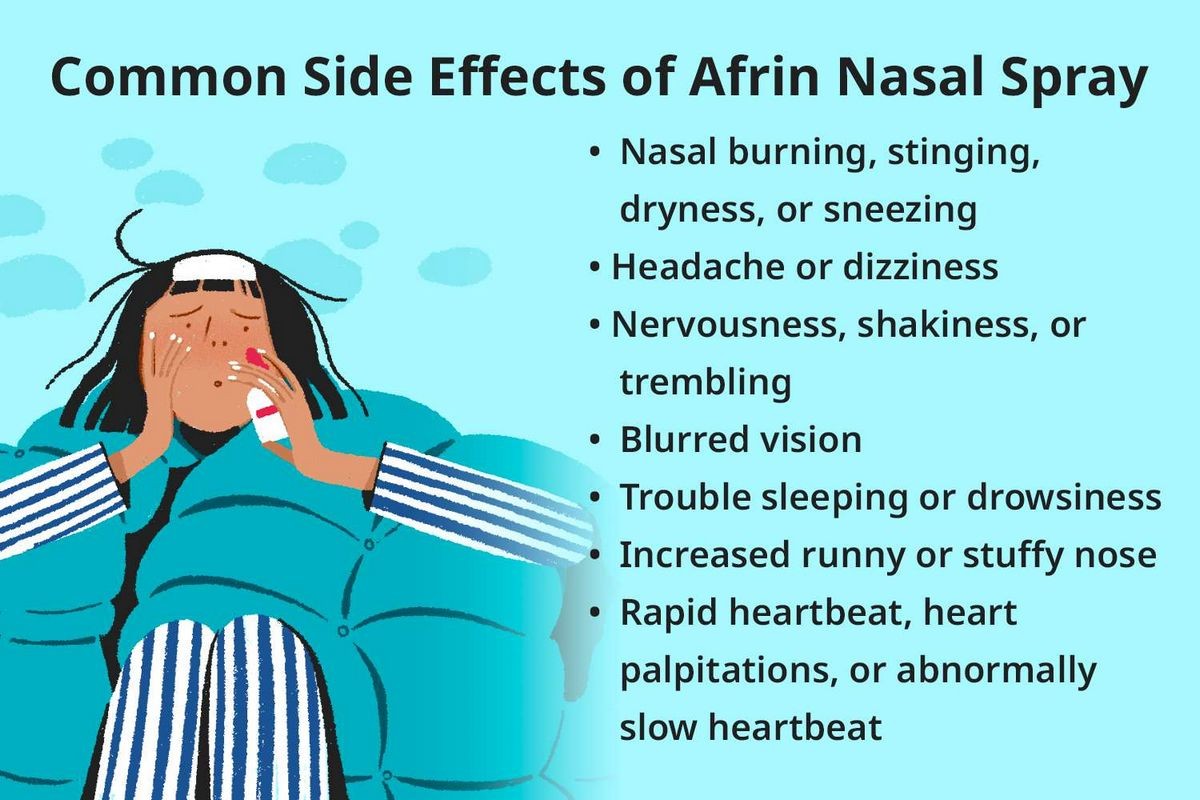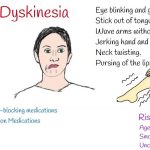
Contents
oxymetazoline intranasal
Oxymetazoline intranasal is a nasal spray medication used for the temporary relief of nasal congestion caused by common cold, hay fever, upper respiratory allergies, and sinus congestion and pressure.
Oxymetazoline intranasal is available over the counter (OTC) and is sprayed as a fine mist into the nostrils. It can also be used off-label topically in the nostrils to reduce blood flow during nasal procedures.
Oxymetazoline intranasal relieves nasal and sinus congestion by constricting blood vessels in the nasal passage. It works by stimulating the alpha-adrenergic receptors in the nasal mucosa. These receptors are protein particles that cause smooth muscles around blood vessels to contract when stimulated. By constricting the small blood vessels, oxymetazoline intranasal reduces blood flow in the nasal mucosa and relieves congestion.
Warnings
- Do not use if hypersensitive to any components in oxymetazoline intranasal solution.
- Prolonged and frequent use may cause rebound nasal congestion or worsen the condition.
- May cause temporary discomfort, including burning, sneezing, stinging, or increased nasal discharge.
- Use with caution in patients with the following conditions: cardiovascular diseases including hypertension and heart disease, diabetes mellitus, thyroid disease, prostate enlargement, and genitourinary obstruction.
Side effects of oxymetazoline intranasal
Common side effects include:
- Nasal dryness
- Nasal irritation
- Burning
- Stinging
- Rebound nasal congestion
- Sneezing
- Increased nasal discharge
- Headache
- Nausea
- Dizziness
- Nervousness
- Insomnia
Serious side effects include:
- Rapid heart rate (tachycardia)
- Slow heart rate (bradycardia)
Call your doctor immediately if you experience fast or pounding heartbeats, fluttering in your chest, shortness of breath, sudden dizziness, severe headache, confusion, slurred speech, severe weakness, vomiting, loss of coordination, feeling unsteady, very stiff muscles, high fever, sweating, confusion, fast or uneven heartbeats, tremors, feeling like you might pass out, blurred vision, tunnel vision, eye pain or swelling, or seeing halos around lights.
This is not a complete list of all side effects or adverse reactions that may occur from the use of this drug. Call your doctor for medical advice about serious side effects or adverse reactions. You may also report side effects or health problems to the FDA at 1-800-FDA-1088.
QUESTION
Dosages of oxymetazoline intranasal
Adult:
Intranasal Solution
Nasal Congestion
- Indicated for temporary relief of nasal congestion
- 2-3 drops/sprays per nostril every 12 hours
- Not to exceed 2 doses/24 hours for 3-5 days
Pediatric:
Intranasal Solution
- 0.05% (Afrin No Drip Extra Moisturizing Stuffy Nose Pump Mist; Mucinex Sinus-Max Clear & Cool; Mucinex Childrens Stuffy Nose)
- 0.025% (Afrin Extra Moisturizing Stuffy Nose Pump Mist)
Nasal Congestion
Indicated for temporary relief of nasal congestion
Children below 2 years
- Safety and efficacy not established
Children 2-5 years
- 0.025%: 2-3 sprays per nostril every 10-12 hours
- Not to exceed 2 doses/24 hours for up to 3 days
Children 6 years and above
- 0.05%: 2-3 drops/sprays per nostril every 10-12 hours
- Not to exceed 2 doses/24 hours for up to 3 days
Overdose
- Intranasal overdose or excessive use can cause rebound nasal congestion, nasal irritation, and systemic effects, particularly in children, which may include respiratory depression, bradycardia, and low blood pressure (hypotension).
- Overdose from oral ingestion can cause nausea, vomiting, lethargy, decreased respiration, tachycardia, bradycardia, low or high blood pressure (hypotension or hypertension), sedation, drowsiness, pupil dilation, stupor, low body temperature, drooling, and coma.
- Overdose is treated with symptomatic and supportive care.
Drug interactions with oxymetazoline intranasal
Inform your doctor of all medications you are currently taking to check for possible drug interactions.
- Oxymetazoline intranasal has no listed severe interactions with other drugs.
- Serious interactions include: isocarboxazid, ozanimod, phenelzine, and tranylcypromine. Other drugs that may interact include amitriptyline, amoxapine, azelastine, clomipramine, cromolyn sodium, desipramine, doxepin, imipramine, ipratropium intranasal, nadolol, nortriptyline, penbutolol, propranolol, protriptyline, safinamide, sotalol, timolol, and trimipramine.
The above interactions are not all of the possible interactions. For more information, visit the RxList Drug Interaction Checker.
Always inform your doctor, pharmacist, or healthcare provider about all medications you use, including prescription and over-the-counter drugs. Check with your doctor or healthcare provider if you have any questions about the medication.
Pregnancy and breastfeeding
- Use oxymetazoline intranasal with caution for occasional relief from nasal congestion during pregnancy only if clearly needed. Excessive use in the first trimester has been associated with adverse fetal effects.
- It is not known if oxymetazoline intranasal is present in breast milk. Use with caution in nursing mothers.
- Do not use any OTC drugs, including oxymetazoline intranasal, without first checking with your healthcare provider if you are pregnant or breastfeeding.
Other important information about oxymetazoline intranasal
- Use oxymetazoline intranasal exactly as prescribed or as per label directions.
- Do not exceed recommended dosages.
- Do not share your spray dispenser with others as it can spread infection.
- If self-medicating with OTC oxymetazoline intranasal, do not use for longer than 3 days. Stop use and consult with a physician if the condition persists or worsens.
- Store safely out of reach of children.
- In case of overdose, seek medical help or contact Poison Control.
Summary
Oxymetazoline intranasal is a nasal spray medication used for the temporary relief of nasal congestion caused by the common cold, hay fever, upper respiratory allergies, and sinus congestion and pressure. Prolonged and frequent use may cause rebound nasal congestion or worsen the condition. Common side effects of oxymetazoline intranasal include nasal dryness, nasal irritation, burning, stinging, rebound nasal congestion, sneezing, increased nasal discharge, headache, nausea, dizziness, nervousness, and insomnia.
Oxymetazoline intranasal is a nasal spray medication used for the temporary relief of nasal congestion caused by the common cold, hay fever, upper respiratory allergies, and sinus congestion and pressure. Prolonged and frequent use may cause rebound nasal congestion or worsen the condition. Common side effects of oxymetazoline intranasal include nasal dryness, nasal irritation, burning, stinging, rebound nasal congestion, sneezing, increased nasal discharge, headache, nausea, dizziness, nervousness, and insomnia.


